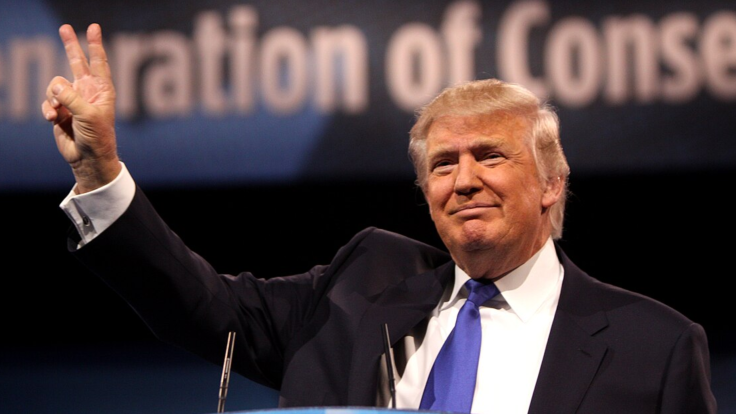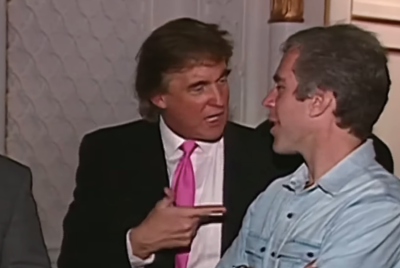Trump 'Increasingly Panicking' As He Scrambles To Stop Epstein Files Release
President Trump reverses stance and calls for the full release of Epstein-related documents

US President Donald Trump has dramatically reversed course and urged fellow Republicans to back the full release of the Jeffrey Epstein files amid mounting political pressure and new document drops that threaten to intensify scrutiny of his past ties.
The U-turn came after weeks of escalating tension between the White House and hardline conservatives demanding transparency about the sprawling Epstein archive. What began as a procedural manoeuvre in the House has hardened into a partisan crisis that exposes the President to renewed questions about what the documents might show, and whether earlier assurances about limited disclosure were sincere.
The shift has set off a scramble inside Republican ranks to control the narrative even as survivor groups and investigators press for unredacted materials to be made public.
Trump's Public Reversal and the Political Fallout
Trump's public appeal for Republicans to vote to release the files, saying 'we have nothing to hide', marks a sharp reversal from previous resistance by some in his orbit and was delivered as more than 20,000 pages from Epstein's estate were circulated to lawmakers.
Republican backbenchers had already forced the issue with a discharge petition designed to compel a House floor vote, arguing that releasing government-held materials would put partisan attacks to rest.
That pressure, combined with a flurry of new estate documents and emails released by House Democrats, appears to have driven the President to a tactical concession aimed at bluntly stabilising his base and shifting blame onto congressional opponents.

What the Files Contain and the Legal Stakes
The Department of Justice has previously declassified and published a first tranche of Epstein-related materials, while later releases to Congressional committees have included call logs, calendars and email troves that in places mention high-profile figures and flights.
The DOJ's own account of its evidence gathering noted more than 300 gigabytes of seized data, including images and videos the department deems sensitive and in some cases criminal.
That technical reality creates a legal tightrope for lawmakers and the executive. The Justice Department and the FBI must balance transparency against federal rules protecting grand jury material, the identities of victims and the preservation of potential criminal material.
Yet much of the material in question is not protected grand jury testimony; it is estate communications and investigatory files already held by agencies or committees, which opponents say could be released safely with redactions to protect victims.
Pressure From Congress, Survivors and the Media
Survivor advocates and Democratic members of the House Oversight Committee have demanded fuller disclosure, saying released snippets raise questions about who knew what and when.
The committee's recent production of tens of thousands of pages has been criticised for heavy redactions and chaotic publication practices, but it has nevertheless amplified calls for a definitive, government-led accounting.
For the White House the politics are brutal. Conservative voices who once attacked the Department of Justice for not acting have turned on the President, accusing him of stonewalling when the files could allay doubts. For others, Trump's reversal looks less like contrition than a tactical pivot intended to blunt a potential wave of negative headlines and to force rivals to assume responsibility for whatever is disclosed.
The President's social media posts and a short video message urging Republicans to vote for release were uploaded publicly, a move designed to make his position plain and to mobilise supporters ahead of the vote.
Institutional Consequences

Beyond the political theatre lies a deeper moral and institutional question, whether the US government will fully reconcile the interests of victims with the public's right to know. Survivors say years of partial disclosures and redactions have denied them full public accounting and accountability for the powerful figures tied to Epstein's circle. For many voters, the issue now tests not only individual reputations but the credibility of institutions meant to protect the vulnerable.
The immediate tactical contest will play out on the House floor this week, where the discharge petition and associated measures face uncertain margins. But even if the documents are released in greater numbers, the political battle over how to interpret them has already been won by those who sought to keep attention on Epstein.
The President's gamble, to appear transparent while attempting to steer the release, may buy short-term relief but it does not remove the legal and human questions that underpin the files.
The long shadow of Epstein's crimes will continue to shape headlines and Congressional hearings for months, and perhaps years, as investigators, journalists and survivors press for clarity and accountability.
Trump's reversal is therefore less an end than the start of a renewed, combustible phase of the Epstein saga that could leave lasting consequences for the President and for the institutions that hold these files.
The House vote will determine whether the papers go fully public, but the political and moral reverberations are already in full effect.
© Copyright IBTimes 2025. All rights reserved.



















